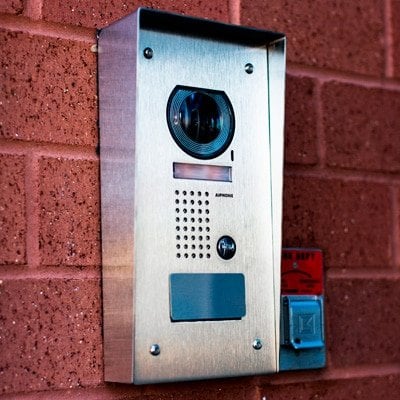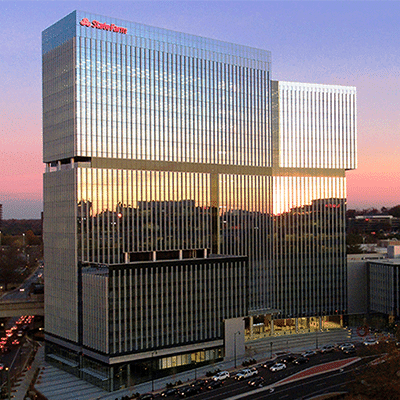ASD® provides access control and CCTV integration on a national level
Access control & surveillance systems keep your organization, people, and assets safe. A robust security infrastructure is essential to growing a safe and secure enterprise. In today's world, you must prepare for physical threats, but what does the right access control & security measures solution look like for your organization?
Access Control
- Card Readers
- Door Readers
- Bluetooth Readers
- Long Range Readers
- Biometrics
- Keypads
- Parking Gates
- Mobile Credentials
- Turnstiles
- Visitor Kiosks
- Badge Printing
- Cloud and On-Prem Systems
- Locking Hardware, including Wireless & PoE Locks
Intrusion Detection
- Network Based Systems
Video Surveillance
- Video Management Systems
- Multi-Site Video System
- Video Intercom
- Control Room Video Walls
- Cloud and On-Prem Systems
- Security Work Stations
- Analog and IP Cameras
Emergency Communications
- Emergency Signaling
- Help Points & Remote Intercoms
- Incident Response
Security Networks
- PDUs and UPS Backups
Whether you need rough numbers to reference in your next meeting or want to talk specifics about access control and video surveillance integration, one of our ASD® experts will gladly help you. Click below for quick ballpark estimates based on industry standards and our project experience.
Technology Installation Budget Calculator
Use our accurate calculator to determine your estimated project costs!
- 1
- 2
- 3
Featured Projects
Below are some of our best access control & surveillance case studies. They showcase technology implementations that are functional, effective, and ultimately an asset to commercial buildings. These physical security systems help property managers, building owners, tenants, and end users manage access to their spaces, even across multiple locations.
Technology Partners
ASD® partners with various industry-leading brands like the samples shown here. Click here to view all of our partners.
Access control

Access Control and Video Surveillance Integration Pricing
When budgeting for an access control project, you must consider how you will use technology to allow visitors and employees to access your space. How will you grant and limit access so people can move around and keep a record of activity? Do you need one door with a key fob or multiple doors with biometrics to gain entry? These factors and any other security features you pick will impact the project's total cost.
Weighing the Costs
The number of entry points plays a significant role in determining the project's cost. Assessing whether a single entry point or multiple doors are used for access helps determine the type and quantity of access control hardware needed. This includes card readers, electronic locks, door controllers, and other necessary components.
The selection of other security measures, such as surveillance cameras, alarm systems, or intrusion detection systems, should be considered when estimating the total cost.
Each chosen security measure adds to the overall project expenses, but it also enhances the level of protection and contributes to the comprehensive security ecosystem.
Making the Decision
By considering these factors and making informed decisions about access control methods, zone restrictions, record-keeping requirements, and additional security features, organizations can develop an accurate budget that aligns with their security objectives and effectively manages the costs associated with implementing an access control system.
Based on our experience, we typically see prices ranging from $1800 per entry to $3000 per entry.
COMMERCIAL ACCESS CONTROL SYSTEMS
Commercial access control systems safeguard businesses, employees, and assets. These systems are designed to regulate and manage entry into commercial premises, providing a secure environment while offering flexibility and convenience.
With technological advancements, modern commercial access control systems have evolved beyond traditional locks and keys.
They employ sophisticated commercial access control solutions such as key cards, keyless door locks, smart locks with mobile access to unlock doors, biometric identification, a camera system, and keypad entry systems to control and monitor access. These systems offer several benefits, including enhanced security, improved operational efficiency, and centralized management.
By implementing a commercial access control system, businesses can restrict unauthorized entry, monitor employee movement, track access events, and quickly revoke access privileges when needed. Additionally, these systems provide an audit trail of access activities, contributing to accountability and compliance. With customizable features, businesses can tailor access levels, time restrictions, and zone limitations to suit their specific requirements.
VIDEO SURVEILLANCE SYSTEMS
Video surveillance systems have become integral to security for commercial buildings and businesses. These systems utilize cameras strategically placed throughout the premises to monitor and record activities in real time. Video surveillance captured by security cameras provides businesses with various benefits, including deterrence of theft and vandalism, enhanced employee safety, and evidence collection for investigations.
Modern video surveillance systems often have advanced features such as motion detection, facial recognition, and high-definition recording, enabling more accurate monitoring and identification. By implementing video surveillance, you can enhance security, mitigate risks, and create a safer environment for employees and customers.
CREDENTIALS
Companies must decide what credentials they will give to the users to allow access. A credential that is a simple key fob would cost less than one with a photo of the user and is also used as the employee's badge.
In addition to traditional key fobs and photo ID badges, companies can explore other credential options to meet their specific needs. Key cards can be used for authorized credential verification, enabling access to events, conference rooms, and other restricted areas. These key cards can be programmed with specific access permissions and can be easily deactivated if lost or stolen, enhancing security systems.
MOBILE ACCESS CONTROL
Mobile access technology has revolutionized how commercial buildings manage entry and enhance security. With mobile access, you can use their smartphones or mobile devices as digital keys, eliminating the need for traditional physical keys or access cards. This innovative solution offers several advantages for commercial buildings.
Without a doubt, mobile access provides a level of convenience that is unparalleled. Authorized individuals can effortlessly enter the building by simply tapping or swiping their smartphones, eliminating the hassle of carrying and managing physical keys or access cards. This seamless and convenient experience saves time and effort for both employees and visitors, enhancing overall satisfaction. In the event of a lost or stolen smartphone, access rights can be swiftly revoked remotely, ensuring the security of the building.
Another advantage of mobile access is its flexibility and scalability. Building administrators can easily grant or revoke access privileges remotely, eliminating the need for physical interaction or reissuing access cards. Temporary access permissions for visitors, contractors, or delivery personnel can also be managed seamlessly, integrating with visitor management systems and improving overall operational efficiency.
Mobile access solutions can be integrated with other building systems, such as video surveillance or building automation, to provide a comprehensive security ecosystem. This integration allows for advanced analytics and insights, offering valuable data on building occupancy, traffic patterns, and security trends. Administrators can make informed decisions, allocate resources effectively, and proactively address security concerns.
SMARTS AT THE DOOR
Explore cutting-edge options like PoE, electronic locks, smart locks, or Bluetooth locks to save on cabling costs and reduce the hardware needed in traditional access control systems.
STAND-ALONE OR ENTERPRISE
A stand-alone system or single interface that does not connect to other sites requires less programming and set-up than a system that controls multiple sites.
LIFE SAFETY
Will the door lock mechanism be required to integrate with the facility fire alarm panel? Integration with the fire alarm system adds a layer of safety and coordination in emergencies. But a system that must integrate with the fire alarm system will cost more than one that does not. It will also require multiple trades to install.
A system that needs to integrate with the fire alarm panel typically involves more advanced hardware and software components to facilitate communication between the two systems. This integration ensures that in the event of a fire alarm activation, the access control system can respond accordingly, such as unlocking doors or overriding access restrictions to facilitate a safe evacuation.
ENTRY POINTS
There are many entry points on a corporate campus and interior office space. A commercial access control system gives you monitoring control. Beyond standard interior and exterior doors, you should consider elevators, parking gates, and turnstiles. Some clients also use access control for the IT rooms or private offices.
By considering all potential entry points and utilizing a commercial access control system, you can enhance security, maintain regulatory compliance, and protect sensitive areas within your corporate campus or office space.
SPECIFIC SYSTEM UTILIZED
Historically, analog access control systems have dominated the market. Analog Access Control Systems require more cabling and infrastructure to support them. Recently, IP-based systems have emerged and, through ethernet cabling and “edge” door controllers, have started to lower costs.
IP-based systems utilize network infrastructure, allowing data and power to be transmitted over a single Ethernet cable. This eliminates the need for separate power wiring, further streamlining the installation process and reducing costs.
Using edge door controllers also eliminates the need for extensive wiring back to a central control panel, as the controllers can communicate directly with the access control software via the network.
LOCKING MECHANISMS
What type of lock will be used? The lock will vary from door to door. A typical electric strike on an office door may cost a few hundred dollars. A standard vertical rod system in a storefront glass door may cost thousands of dollars.
The cost disparity between different lock types is primarily attributed to their complexity, functionality, and level of integration with the access control system.
More advanced lock systems often incorporate additional components, such as sensors, alarms, or advanced locking mechanisms, contributing to their higher price point. Also, the materials used and the customization required for specific door types can impact the overall cost of the lock.
Common Cost Factors for Most Projects
GEOGRAPHIC LOCATION
Where is the project located? Some parts of the country are more expensive than others. Some rural areas may require travel due to the availability of field resources which could increase costs.
SIZE & TYPE ENVIRONMENT
The type of environment will impact the price. Class A Office, Distribution Centers, Manufacturing, Retail, and Indoor vs. Outdoor could all affect the overall cost.
LABOR REQUIREMENTS
Projects installed with a Union Labor requirement will be more expensive than projects without the need. Some projects require a prevailing wage to be paid to a technician, which can also increase costs.
PERMITTING
Permitting varies from state to state and city to city. One city may not require more than an application form to receive a permit, while others may want fully engineered drawings that go through a plan review process. The complete set of engineered drawings carries a substantial price tag that elevates the overall system cost. Another consideration is the time required if the review process is a requirement.
NEW CONSTRUCTION VS RENOVATION
New construction will typically be less expensive than renovation. During new construction, a security system can be seamlessly integrated into the initial design and layout of the building. It eliminates the need for extensive modifications to existing structures, saving time and costs associated with retrofitting.
LOCAL CODES & STANDARDS
Local codes can drive cost as they vary in requirement. For instance, in some locations across the U.S., all overhead cables must run in conduit, while others can be supported with J-Hooks in the ceiling.
Understanding and adhering to the local codes and requirements is essential for accurately estimating and managing the costs of security implementation, ensuring compliance, and avoiding potential penalties or delays.
INFRASTRUCTURE
Pathways can contribute significantly to overall system costs. Costs of core holes sizing and cutting slab for conduits must be considered in your budgeting process.
ECONOMIES OF SCALE
What type of structure is being built? Commercial access control systems in a manufacturing plant are developed differently than in a high-rise office building. An apartment complex can reuse the same templates for each facility; this saves design time and costs.
INSTALLATION HOURS
Normal working hours will be less expensive than after-hours or weekends.
Let's discuss your access control & surveillance needs
Contact an ASD®associate to discuss a solution for you.



